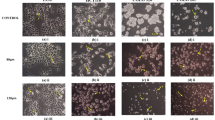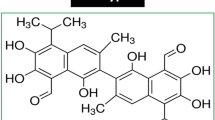Abstract
Soybean isoflavonoids have received significant attention due to their potential anticarcinogenic and antiproliferative effects and possible role in many signal transduction pathways. However, their mechanisms of action and their molecular targets remain to be further elucidated. In this paper, we demonstrated that two soybean isoflavones (genistein and daidzein) reduced the proliferation of the human colon adenocarcinoma grade II cell line (HT-29) at concentrations of 25 and 50–100 μM, respectively. We then investigated the effects of genistein and daidzein by RT-PCR on molecules that involved in tumor development and progression by their regulation of cell proliferation. At a concentration of 50 μM genistein, there was suppressed expression of β-catenin (CTNNBIP1). Neither genistein nor daidzein affected APC (adenomatous polyposis coli) or survivin (BIRC5) expression when cells were treated with concentrations of 10 or 50 μM. These data suggest that the down-regulation of β-catenin by genistein may constitute an important determinant of the suppression of HT-29 cell growth and may be exploited for the prevention and treatment of colon cancer.





Similar content being viewed by others
References
American Cancer Society. Cancer Facts & Figures 2009. Atlanta: American Cancer Society; 2009.
Birt DF, Hendrich S, Wang W. Dietary agents in cancer prevention: flavonoids and isoflavonoids. Pharmacol Ther. 2001;90:157–77.
Sarkar FH, Li Y. Cell signaling pathways altered by natural chemopreventive agents. Mutat Res. 2004;555:53–64.
Moon YJ, Wang X, Morris ME. Dietary flavonoids: effects on xenobiotic and carcinogen metabolism. Toxicol In Vitro. 2006;20:187–210.
Polakis P. Wnt signaling and cancer. Genes Dev. 2000;14:1837–51.
Mariadason JM, Bordonaro M, Aslam F, Shi L, Kuraguchi M, Velcich A, Augenlicht LH. Down-regulation of b-catenin TCF signaling is linked to colonic epithelial cell differentiation. Cancer Res. 2001;61:3465–71.
Luu HH, Zhang R, Haydon RC, Rayburn E, Kang Q, Si W, Park JK, Wang H, Peng Y, Jiang W, He TC. Wnt/β-catenin signaling pathway as novel cancer drug targets. Curr Cancer Drug Targets. 2004;4:653–71.
Pinho MSL. A Estória Biomolecular Do Pólipo Adenomatoso. Rev bras Coloproct. 2006;26(2):197–203.
Yang M, Zhong WW, Srivastava N, Slavin A, Yang J, Hoey T, An S. G protein-coupled lysophosphatidic acid receptors stimulate proliferation of colon cancer cells through the β-catenin pathway. Proc Natl Acad Sci USA. 2005;102:6027–32.
Zhang T, Otevrel T. Gao Zhengiang, Gao Zhiping, Ehrlich SM, Fields JZ, Boman BM. Evidence that APC regulates survivin expression: a possible mechanism contributing to the stem cell origin of colon cancer. Cancer Res. 2001;62:8664–7.
Kim PJ, Plescia J, Clevers H, Fearon ER, Altieri DC. Survivin and molecular pathogenesis of colorectal cancer. Lancet. 2003;362:205–9.
Altieri DC. The molecular basis and potential role of survivin in cancer diagnosis and therapy. Trends Mol Med. 2001;7(12):542–7.
Chandra SHV, Wacker I, Appelt, UK, Behrens J, Schneikert J. A common role for various human truncated adenomatous polyposis coli isoforms in the control of beta-catenin activity and cell proliferation. PLoS ONE. 2012;7(4):e34479. doi:10.1371/journal.pone.0034479.
Pfaffl MW. A new mathematical model for relative quantification in real-time RT-PCR. Nucleic Acids Res. 2001;29(9):2002–7.
Pfaffl MW, Horgan GW, Dempfle L. Relative expression software tool (REST) for group-wise comparison and statistical analysis of relative expression results in real-time PCR. Nucleic Acids Res. 2002;30(9):e36.
Kanadaswami C, Lee LT, Lee PPH, Hwang JJ, Ke FC, Huang YT, Lee MT. The antitumor activities of flavonoids. In vivo. 2005;19:895–910.
Ren W, Qiao Z, Wang H, Zhu L, Zhang L. Flavonoids: promising anticancer agents. Med Res Rev. 2003;23(4):519–34.
Kuntz S, Wenzel U, Daniel H. Comparative analysis of the effect of flavonoids on proliferation, cytotoxicity, and apoptosis in human colon cancer cell lines. Eur J Nutr. 1999;38:133–42.
Chen WF, Huangc MH, Tzangc CH, Yangc M, Wong MS. Inhibitory actions of genistein in human breast cancer (MCF-7) cells. Biochim Biophys Acta. 2003;1638:187–96.
Wang H, Zhu Y, Li C, Xie L, Chen G, Nie Y, Zhang R. Effects of genistein on cell cycle and apoptosis of two murine melanoma cell lines. Tsinghua Sci Technol. 2007;12:372–80.
Chodon D, Ramamurty NE, Sakthisekaran D. Preliminary studies on induction of apoptosis by genistein on HepG2 cell line. Toxicol In Vitro. 2007;21:887–91.
Choi EJ, Kim GH. Daidzein causes cell cycle arrest at the G1 and G2/M phases in human breast câncer MCF-7 and MDA-MB-453 cells. Phytomedicine. 2008;15:683–90.
Sergent T, Garsou S, Schaut A, De Saeger S, Pussemier L, Van Peteghem C, Larondelle Y, Schneider YJ. Differential modulation of ochratoxin A absorption across Caco-2 cells by dietary polyphenols, used at realistic intestinal concentrations. Toxicol Lett. 2005;159:60–70.
Narayan S, Roy D. Role of APC and DNA mismatch repair genes in the development of colorectal cancers. Mol Cancer. 2003;2:41.
Fearnhead NS, Britton MP, Bodmer WF. The ABC of APC. Hum Mol Genet. 2001;10(7):721–33.
Lee JH, Park CH, Jung KC, Rhee HS, Yang CH. Negative regulation of beta-catenin/Tcf signaling by naringenin in AGS gastric cancer cell. Biochem Biophys Res Commun. 2005;335:771–6.
Park CH, Hahm ER, Lee JH, Jung KC, Yang CH. Inhibition of beta-catenin-mediated transactivation by flavanone in AGS gastric cancer cells. Biochem Biophys Res Commun. 2005;331:1222–8.
Park CH, Chang JY, Hahm ER, Park S, Kim HK, Yang CH. Quercetin, a potent inhibitor against beta-catenin/Tcf signaling in SW480 colon cancer cells. Biochem Biophys Res Commun. 2005;328:227–34.
Li W, Wang Z, Kong D, Li R, Sarkar SH, Sarkar FH. Regulation of Akt/FOXO3a/GSK-3β/AR signaling network by isoflavone in prostate cancer cells. J Biol Chem. 2008;283(41):27707–16.
Verma UN, Surabhi RM, Schmaltieg A, Becerra C, Gaynor RB. Small interfering RNAs directed against β-catenin inhibit the in vitro and in vivo growth of colon cancer cells. Clin Cancer Res. 2003;9:1291–300.
Choi BR, Gwak J, Kwon HM, Oh S, Kim KP, Choi WH, Cho Y, Kim DE. Oligodeoxyribozymes that cleave β-catenin messenger rna inhibit growth of colon cancer cells via reduction of β-catenin response transcription. Mol Cancer Ther. 2010;9:1894–902.
Zhang T, Fields JZ, Opdenaker L, Otevrel T, Masuda E, Palazzo JP, Isenberg GA, Goldstein SD, Brand M, Boman BM. Survivin-induced aurora-B kinase activation. Am J Pathol. 2010;177(6):2816–26.
Pennati M, Folini M, Zaffaroni N. Targeting survivin in cancer therapy: fulfilled promises and open questions. Carcinogenesis. 2007;28(6):1133–9.
Miao GY, Lu QM, Zhang XL. Downregulation of survivin by RNAi inhibits growth of human gastric carcinoma cells. World J Gastroenterol. 2007;13(8):1170–4.
Shen YM, Yang YC, Song ML, Qin CH, Yang C, Sun YH. Growth inhibition induced by short hairpin RNA to silence survivin gene in human pancreatic cancer cells. Hepatobiliary Pancreat Dis Int. 2010;9:69–77.
Weglarz L, Molin I, Orchel A, Parfiniewicz B, Dzierzewicz Z. Quantitative analysis of the level of p53 and p21WAF1 mRNA in human colon cancer HT-29 cells treated with inositol hexaphosphate. Acta Biochim Pol. 2006;53:349–356.
Acknowledgments
The authors thank the Araucária Foundation, CNPq, and CAPES.
Conflict of interest
The authors have no conflicts of interest that are directly relevant to the content of this manuscript.
Author information
Authors and Affiliations
Corresponding author
Rights and permissions
About this article
Cite this article
Lepri, S.R., Zanelatto, L.C., da Silva, P.B.G. et al. The effects of genistein and daidzein on cell proliferation kinetics in HT29 colon cancer cells: the expression of CTNNBIP1 (β-catenin), APC (adenomatous polyposis coli) and BIRC5 (survivin). Human Cell 27, 78–84 (2014). https://doi.org/10.1007/s13577-012-0051-6
Received:
Accepted:
Published:
Issue Date:
DOI: https://doi.org/10.1007/s13577-012-0051-6




